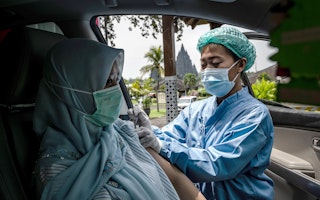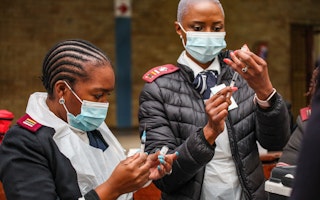The World Can Learn from Georgia’s Experience with COVID-19
By Keti Khutsishvili

Over four million cases of COVID-19 infections have now been reported globally, with some of the world’s wealthiest countries, including the United States, the United Kingdom, France, and Italy, among the hardest hit. Yet in the grim reckoning of the COVID-19 pandemic, it seems that each country has a different story to tell.
Georgia, a country of around 4 million located in the Caucasus, ranks 70th on the United Nations’ Human Development Index. Despite its limited resources, however, it has been able to curb the spread of the virus, with only 652 confirmed cases—and 12 deaths—as of mid-May.
How has the government of Georgia done it? By acting early, taking drastic measures even though they would hurt the country’s economy, and by mobilizing broad support—including from independent civil society groups.
After China announced the existence of the novel virus and the first deaths in early January, for example, Georgia took immediate steps to halt all flights from China. As the virus began spreading to other countries, including nearby Iran, Georgian authorities instituted temperature checks at airports and land crossings and began identifying and quarantining travelers—all before there was a single confirmed case in the country.
As a result, officials believe they were able to identify and stop the first person carrying the virus who tried to enter the country. These measures bought Georgia valuable time.
Georgia was also quick to adopt its Center for Disease Control’s recommendations, closing all schools in the entire country on March 2, when there were only three confirmed cases. For comparison, schools in the New York City area were not closed until March 16, when the city had 463 confirmed cases.
Georgian authorities also worked with the top bio lab in the country to stockpile COVID-19 tests and focused on getting the result turnaround time to under 24 hours. Since then, Georgia has gone even further, implementing a nightly curfew and closing businesses. These steps were not easy in Georgia, where the economy was already struggling before the pandemic, but Georgian authorities chose to put life first.
Because of their experience with Georgia’s limited health care system, meanwhile, medical experts knew that they did not have the equipment or staff to manage the pandemic, and that slowing it was the only option. When high-tech solutions weren’t available, seemingly simple and lower-tech solutions were implemented—and they worked.
Georgia’s troubled history informed the response and reaction to COVID-19. Georgians remember the protests and turmoil as the Soviet Union collapsed, the military conflicts of the 1990s, and the Russian invasion of 2008. As a result, there was a preparedness in society to sacrifice mobility and convenience for the sake of confronting a serious threat.
But it is not just Georgia’s experience with a turbulent past that has made it adept at dealing with this pandemic. Its large and energetic independent civil society sector was able to mobilize, supporting government efforts to share public health information about the virus on social media, creating informational material for Georgians with hearing and visual impairments, and delivering food to the elderly and most vulnerable.
Now, another wave of civil society activities—funded in part by the Open Society Georgia Foundation, of which I am the executive director, as well as by other donors—has started. Initiatives such as a hotline for those experiencing depression during the isolation of the shutdown, a systematic approach to educating health care workers about the disease, and developing protocols for treatment at different stages are all being considered.
Georgia’s success so far shows what can be done to combat COVID-19, even in a country of limited means. For those of us in Georgia, it has been a story of prompt action by the government, a strong response from civil society, and the public’s willingness to make necessary sacrifices. All these strengths give us reasons for hope as we face the uncertainties ahead.
Keti Khutsishvili is the executive director of the Open Society Georgia Foundation.


